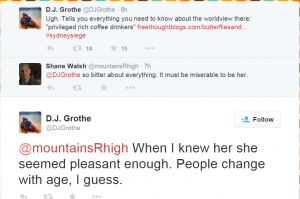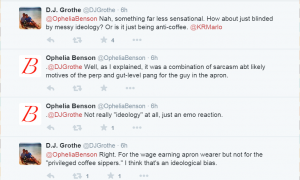NPR did a blog post about Vani Hari aka “Food Babe” the other day.
…as her profile grows, so too do the criticisms of her approach. Detractors, many of them academics, say she stokes unfounded fears about what’s in our food to garner publicity. Steve Novella, a Yale neuroscientist and prominent pseudoscience warrior, among others, has dubbed Hari the “Jenny McCarthy of food” after the celebrity known for championing thoroughly debunked claims that vaccines cause autism.
Hari is a self-styled consumer advocate and adviser on healthful eating.
Her website, FoodBabe.com, offers recipes, tips for nutritious dining while traveling, and, for $17.99 a month, “eating guides” that include recipes, meal calendars and shopping lists. But she’s best-known for her food investigations, frequently shared on social media — posts in which she flags what she deems to be questionable ingredients.
But if you’re going to pay attention to someone’s food investigations, you want it to be someone who knows the subject, or at least knows how to ask people who know the subject. Hari isn’t that sort of someone.
Take, for example, Hari’s campaign urging beer-makers to reveal the ingredients in their brews. Among the ingredients that concerned Hari was propylene glycol, a chemical used in antifreeze. But, as cancer surgeon and blogger David Gorski writes,the product used in some beers to stabilize foam is actually propylene glycol alginate — which is derived from kelp. “It is not the same chemical as propylene glycol, not even close. It is not antifreeze,” he wrote.
Like that. That’s not useful.
Another beer ingredient that got Hari up in arms? Isinglass, or dried fish swim bladders, which may sound, well, fishy, but has been used to clarify beers for well over a century. Such mix-ups prompted historian Maureen Ogle, the author of Ambitious Brew: The Story of American Beer, to dissect Hari’s claims, point by point, in a post on her site titled “What’s In YOUR Beer? Or, The Dangers of Dumbassery.”
Hari’s approach capitalizes on growing consumer distrust of both Big Food companies and their unfamiliar, industrial-sounding ingredients, and of regulators’ ability to oversee them effectively. Some of these chemicals and additives may indeed be questionable, but food scientists would argue that nearly all are safe. So why do food companies respond to her demands, if they have nothing to hide?
Because, Gorski writes, “companies live and die by public perception. It’s far easier to give a blackmailer like Hari what she wants than to try to resist or to counter her propaganda by educating the public.”
Critics note that Hari lacks credentials in nutrition or food science; she’s a former consultant who studied computer science. Hari declined to be interviewed for this story; through her publicist, she told NPR she isn’t speaking to media until her new book is released in February. But when the Charlotte Observerasked her about such criticisms, Hari answered, “I’ve never claimed to be a nutritionist. I’m an investigator.”
But that lack of training often leads her to misinterpret peer-reviewed research and technical details about food chemistry, nutrition and health, says Kevin Folta, a professor of horticultural sciences at the University of Florida and vocal online critic of Hari.
It’s kind of the same principle as rewiring. I’m sure you’re familiar with the Rewiring Principle. It states that when you decide you need to update the electrical wiring in your house, you don’t ask someone random to do it for you, you find a licensed electrician who knows how to do wiring in such a way that it won’t burst into flames some night while you’re asleep.
So why not simply ignore Hari? Because her reach is growing: Last month her op-edwas featured in The New York Times’ Room for Debate section. In October,Experience Life magazine, a health and fitness publication, featured her on its cover. That decision prompted critics to bombard the magazine’s Amazon page with single-star reviews for putting “an uneducated fearmonger” on its cover.
And this fall, Hari addressed the University of Florida as part of a lecture series for freshmen on “The Good Food Revolution.” That talk prompted Folta to write a scathing blog post about her visit in which he accused her of being “afraid of science and intellectual engagement.”
He was angry that her talk didn’t include a question and answer period in which he could challenge her on some of her scientific assertions. “When you bring in a self-appointed expert, a celebrity more than a scientific figure, it does have the effect of undoing the science we are trying to instill in our students,” Folta told me.
I want the licensed electrician every time.
(This is a syndicated post. Read the original at FreeThoughtBlogs.)






